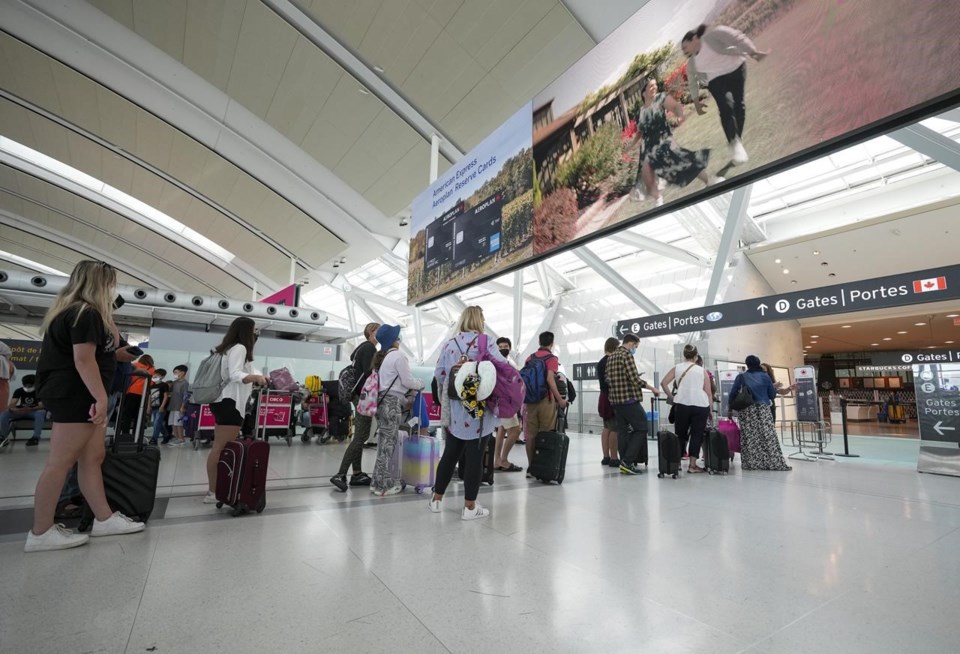MONTREAL — The federal government has rolled out a revamp of its trusted-traveller program to clear any clogged airports as the summer travel season kicks off.
A tweaked "verified-traveller program" will open dedicated security screening lines at six of the country's biggest airports between June 7 and June 21, Transport Minister Omar Alghabra said Tuesday.Â
"As membership grows over time, the new verified-traveller program will help improve the screening experience for more and more passengers while supporting the highest standards of safety and security," Alghabra said during a news conference at Toronto's Pearson airport.
Program changes include allowing trusted travellers to keep their shoes, belt and jacket on throughout screening. They can leave laptops and liquids in their bags instead of placing them separately onto the X-ray conveyor belt. And they can now have children under 18 and adults 75 accompany them through the expedited queues.
Eligible passengers include the roughly 1.7 million Nexus members — pre-approved travellers who can cross the U.S.-Canada border more quickly — as well as military personnel, aviation workers and RCMP officers. Those eligible can access the lines without applying beforehand.
The announcement comes after months of travel chaos last summer, when a surge in post-pandemic demand gummed up terminals and overwhelmed airlines. The 300 per cent increase in travel volume "shook the system, and every little thing caused further delay," Alghabra said Tuesday.
In March, the Liberal budget laid out $1.8 billion over five years for the Canadian Air Transport Security Authority (CATSA) to speed up passenger screening and strengthen airport security measures.
With traveller complaints to the regulator now topping 47,000, the government also tabled an overhaul to its passenger rights charter last month that ratchets up penalties on airlines and targets compensation loopholes around luggage and flight disruption.
"The next few months are going to be very busy as the summer season is about to begin. And I'm confident, with the preparation that has been taking place by airports, airlines, CATSA and other organizations, that we are ready for the summer season," Alghabra said.
The updated program will reduce lines for all passengers, as more become "verified" — shrinking the pool of non-verified travellers — said Greater Toronto Airports Authority spokeswoman Karen Mazurkewich. With speedier screening at trusted-traveller checkpoints, CATSA can also allocate more resources to the regular security queues, Alghabra said.
However, aviation expert John Gradek expressed doubt about the overall impact of a slightly shorter wait for a fraction of air travellers, noting the new program loosens a few screening rules but essentially remains similar to the previous set-up.
"To me, it's more a game of sliding cups. Basically you go from one name to another name, called 'verified traveller,'" he said in a phone interview.
Gradek, a lecturer at McGill University's aviation management program, also questioned whether a substantial number of Canadians would opt to apply for Nexus and thus slim down the standard security lineup.
"You're going to have to go after a new set of travellers — non-Nexus cardholders today — to get them to sign up for Nexus. But if (Alghabra) is in fact investing in people and equipment as well as changing processes so that everybody goes much faster, there might be value," he said.
The Canadian Airports Council welcomed the rollout of "risk-based screening" — referring to not only separate lines, which were already in place, but the different security protocols set to begin next month. Risk-based screening has been underway at U.S. airports for more than a decade, noted council president Monette Pasher.
She called on the government and the airport security agency to expand the scheme and create "a true domestic trusted-traveller program so that more Canadians can take advantage" of the quicker queues.
Currently, most would have to make a multi-step application for membership in Nexus. Interviews with Canadian and U.S. border agents often require a visit to a U.S. enrolment centre; those wanting to avoid a cross-border trip can conduct a joint sit-down with authorities at one of only eight airports in six provinces.
Alghabra said the government is "exploring other options for travellers to subscribe" to the rejigged program beyond Nexus membership or job title. As to how that might happen, "I don't have an answer for you yet."
Nexus enrolment ramped back up last month after a nearly yearlong shutdown. The process remained on hold in Canada even after centres unlocked their doors in the United States, due in part to a clash over U.S. agents' right to carry guns on Canadian soil, among other legal protections.
The standoff led to a massive backlog in applications for the program. But the Canada Border Security Agency is now processing 10,000 per week, Alghabra said.
The number of applications had ballooned by 21 per cent in three months to 342,000 in July, but shrunk to roughly 212,000 as of mid-March.
Meanwhile, airport security staffing — one of multiple causes behind last year's travel turmoil — has now exceeded its targets, said CATSA chief executive Nada Semaan.
"We're, knock on wood, feeling great about our staffing and our ability this summer," she said.
Starting next month, airports where trusted travellers can enjoy the fruits of that status are: Toronto's Pearson, Montreal, Vancouver, Calgary, Winnipeg and Edmonton. Security at several other airports will provide the select passengers with front-of-the-line service, Alghabra said.
This report by The Canadian Press was first published May 23, 2023.
Christopher Reynolds, The Canadian Press


